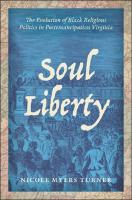Soul Liberty
The Evolution of Black Religious Politics in Postemancipation Virginia
| dc.contributor.author | Turner, Nicole Myers | |
| dc.date.accessioned | 2023-10-04T14:18:19Z | |
| dc.date.available | 2023-10-04T14:18:19Z | |
| dc.date.issued | 2020 | |
| dc.identifier | ONIX_20231004_9798890857620_6 | |
| dc.identifier | OCN: 1142012122 | |
| dc.identifier.uri | https://library.oapen.org/handle/20.500.12657/76554 | |
| dc.description.abstract | That churches are one of the most important cornerstones of black political organization is a commonplace. In this history of African American Protestantism and American politics at the end of the Civil War, Nicole Myers Turner challenges the idea of black churches as having always been politically engaged. Using local archives, church and convention minutes, and innovative Geographic Information Systems (GIS) mapping, Turner reveals how freedpeople in Virginia adapted strategies for pursuing the freedom of their souls to worship as they saw fit—and to participate in society completely in the evolving landscape of emancipation. Freedpeople, for both evangelical and electoral reasons, were well aware of the significance of the physical territory they occupied, and they sought to organize the geographies that they could in favor of their religious and political agendas at the outset of Reconstruction. As emancipation included opportunities to purchase properties, establish black families, and reconfigure gender roles, the ministry became predominantly male, a development that affected not only discourses around family life but also the political project of crafting, defining, and teaching freedom. After freedmen obtained the right to vote, an array of black-controlled institutions increasingly became centers for political organizing on the basis of networks that mirrored those established earlier by church associations. We are proud to announce that this book will also be published as an enhanced open-access e-book on a companion website hosted by Fulcrum, an innovative publishing platform launched by Michigan Publishing at the University of Michigan Library. The Fulcrum version of the book can be located using this link: https://doi.org/10.5149/9781469655253_Turner. | |
| dc.language | English | |
| dc.subject.other | 19th century African American History | |
| dc.subject.other | African Americans Church History | |
| dc.subject.other | black church history | |
| dc.subject.other | Reconstruction in Virginia | |
| dc.subject.other | African American Religious History | |
| dc.subject.other | Emancipation in Virginia | |
| dc.subject.other | African American Political History | |
| dc.subject.other | Gender and race | |
| dc.subject.other | Race relations in postemancipation south | |
| dc.subject.other | History of Black churches | |
| dc.subject.other | Black church studies | |
| dc.subject.other | African Americans in Virginia | |
| dc.subject.other | History of Christianity | |
| dc.subject.other | Church history, 1700-1899 | |
| dc.subject.other | Baptist church history in Virginia | |
| dc.subject.other | Episcopal Church history in Virginia | |
| dc.subject.other | Reformed Zion Union Apostolic Church History | |
| dc.subject.other | Black manhood and womanhood | |
| dc.subject.other | Theological education | |
| dc.title | Soul Liberty | |
| dc.title.alternative | The Evolution of Black Religious Politics in Postemancipation Virginia | |
| dc.type | book | |
| oapen.identifier.doi | 10.5149/9781469655246_Turner | |
| oapen.relation.isPublishedBy | 29b4cf74-8c0a-422f-9d27-e862ca722861 | |
| oapen.relation.isFundedBy | 0cdc3d7c-5c59-49ed-9dba-ad641acd8fd1 | |
| oapen.relation.isbn | 9798890857620 | |
| oapen.relation.isbn | 9781469655246 | |
| oapen.relation.isbn | 9781469655239 | |
| oapen.relation.isbn | 9781469655222 | |
| oapen.relation.isbn | 9781469655253 | |
| oapen.imprint | The University of North Carolina Press | |
| oapen.pages | 232 | |
| oapen.place.publication | Chapel Hill | |
| oapen.grant.number | [...] |

